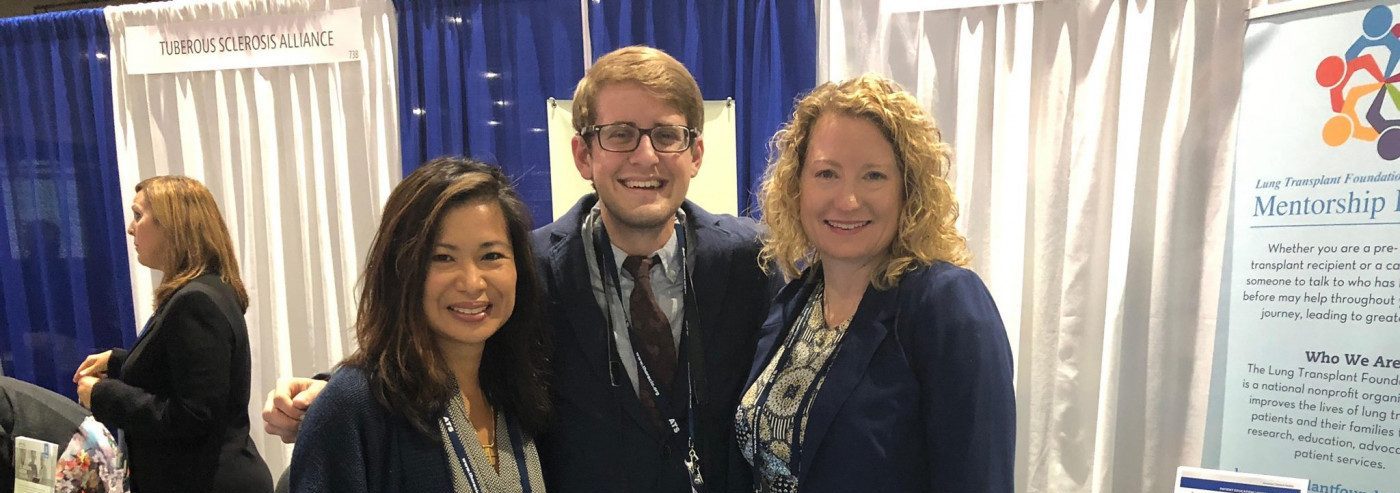Who Runs the Ward? Women.
Written by |

Brad with Dr. Christine Gould, left, and Dr. Jane Gross. (Courtesy of Brad Dell)
I’ve been in sticky situations with dude doctors. With many male doctors, it’s a CF battle. We’re overcome by politics and competition; tackling for command and barking orders at each other. Yes, it’s mutual because I’m a stubborn dude, too. That said, I’ve had some incredible docs who are men, including my current ones. But I’d be lying if I said I’m not on guard when men are heading my care.
On the flip side, with most female doctors, it’s CF care. We’re brainstorming ways to balance quality of life, and we’re both laughing and crying. My male competitive nature ebbs away, and I see my doctors as motherly. I can say, without awkwardness, that I love them.
This column is not about the dude doctors. It’s a celebration of some of the women who saved my life.
I attended the American Thoracic Society conference in San Diego last May and ran into two of my past CF specialists, Dr. Christine Gould and Dr. Jane Gross. We went out for lunch and laughed over fancy tacos; professionalism completely dropped. It’s funny that professionalism still existed (in admittedly scant amounts) while I rolled around in soiled hospital sheets “back in the day,” before my double-lung transplant.
Beaming, they stared at me from across the table; not with the analytical, clinical gaze I was used to, but with fascination. Dr. Gould: “I can’t get over how much you’re eating!” I laugh as I write this, realizing that remark would be offensive at any other lunch. But these docs only ever knew the pre-transplant boy who refused to touch food he’d inevitably vomit hours later.
We shared some tears over those tacos. For once, the tears were not products of grief-laced stress over decisions that could determine my life course. Instead, the tears were from relief that the past terrifying decisions paid off and put me in that restaurant seat, healthier than ever before.
It was Dr. Gross who, miraculously, kept me stable while Mycobacterium abscessus ripped into my lungs; in a time before we had solid treatment guidelines. It was Dr. Gould who did what others could not — convince me to consider transplantation, then fly me across the Pacific Ocean to a transplant center when most doubted I’d even survive the surgery. Their empathy and gentle, yet firm, spirits calmed me at times I’d have otherwise lashed out in frustration.
Our time together wasn’t all candy and dandy; we had high-adrenaline moments and painful talks that no person should have. But without those tough times, I wouldn’t have ended up before Dr. Jasleen Kukreja, surgical director of the University of California, San Francisco’s Lung Transplant Program. There was an article written about her that contrasted her short height (5 feet, 4 inches) against her mighty capabilities. Somehow, in the clinic during my transplant evaluation, she towered over 5 feet, 7 inches me. She’s blunt and wholly confident without a trace of arrogance. She’s just good, simple as that.
Dr. Kukreja communicated with me by typing in a Word doc, as I was deaf at the time. She turned the monitor toward me and stared down into my eyes before I shifted my head to look at the computer screen. The Times New Roman words pierce my brain fog-addled memory: “I will pick only the most perfect lungs for you. You trust me, and you live. There is no room for doubt. Do you trust me?” Here she was, saving my life, yet her eyes had a deadly glint. “I trust you.” The glint softened as she finally, warmly, smiled and told me, “I think you will have a very good lifespan.” After a life of having my “short life expectancy” stamped on me like an expiration date on a jug of milk, her words were a warm blanket.
Two months later, Dr. Kukreja offered me “high-risk” lungs, which means there’s a slightly higher chance that there’s something wrong with them. I remembered her words and accepted. I’m one of the “lucky” CF transplant patients who didn’t have acute organ rejection or infection in the first 18 months since transplantation. She gave me the perfect lungs, as she had promised. I now realize that while the lungs were high-risk, having Dr. Kukreja helm my transplant created the least possible risk for my surgery.
These are women who have all persevered in their field. I’ve seen female doctors, nurses, specialists, techs, and students interrupted time and time again while men flaunted their knowledge. I’ve observed the hardships of being a woman in a field of men with doctorate degrees. Female doctors persist, and because they do, I thrive today. I am in awe.
Check out this study, this study, and this New York Times article about how women in medicine make a world of difference. Also, follow my adventures on my Facebook page.
***
Note: Cystic Fibrosis News Today is strictly a news and information website about the disease. It does not provide medical advice, diagnosis, or treatment. This content is not intended to be a substitute for professional medical advice, diagnosis, or treatment. Always seek the advice of your physician or other qualified health provider with any questions you may have regarding a medical condition. Never disregard professional medical advice or delay in seeking it because of something you have read on this website. The opinions expressed in this column are not those of Cystic Fibrosis News Today, or its parent company, Bionews Services, and are intended to spark discussion about issues pertaining to cystic fibrosis.








Jane
Thank you for sharing.